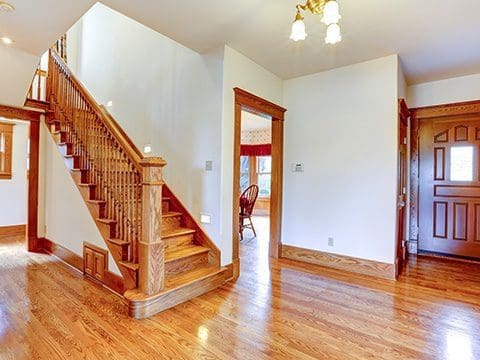Wooden Flooring
Wooden flooring is a highly appealing flooring solution that is natural and works around the house. Available in various species, finishes, board sizes, and colors, the only thing that’s limiting a wood flooring project is your imagination.
When it comes to finding the perfect material, hardwood isn’t the only choice that offers you the look of wooden flooring in your house. Several artificially manufactured materials are designed to simulate the look of wood, such as Vinyl wooden flooring. These artificial materials offer a number of advantages that natural wood can’t provide. Similarly, there are some inherent properties of natural wood flooring that no manufacturer can identically mimic.

Like we all know, hardwood is a natural material that is produced when trees are harvested. Vinyl, on the other hand, is a human-made material that is manufactured from petroleum. Vinyl wooden flooring refers to the vinyl that has been printed with markings and the color found in natural wood. Thanks to the advancements in printing technology, vinyl products can now simulate the look of various species of wood accurately.
If you are planning on choosing the best flooring option for your home in McKinney, TX, then you’re in luck. In today’s blog, we will differentiate between both these materials based on various factors an average consumer looks for while selecting.
Costs
Hardwood flooring: Natural wood flooring could cost anywhere from $8 to $25 per square foot. This could vary depending on the type of wood used. If you want, softwood materials like pine and plywood sheets can be purchased for far less cost. However, this type of material is less durable and generally is a less desirable option for most. Uncommon and rare hardwood materials tend to cost more.
Vinyl wood flooring: Costing anywhere from $2 to $5 per square foot for decent quality materials, vinyl wood can go as low as $1 per square foot. Remember, the cheaper the price goes, the less Durability and looks it offers. Even though the vinyl sheet costs comparatively less, the installation will be more expensive, thus balancing the price. Specialty prints, textures, and design choices will raise the cost of the product higher.
Life cycle and Durability
Hardwood flooring: if properly maintained and cared for, hardwood flooring could last for generations. This usually depends on the type of wood. The material may be tough and might even be resistant to damage. Moreover, some treatments can be used to reinforce the natural strength of the wood. If you end up damaging the floor, it can also be refurbished or repaired, revitalizing the materials and making it look brand new.
Vinyl wood flooring: there are two major types of vinyl wood available in the market: solid and printed. Printed materials ideally have an invisible wear layer that protects the surface from scratching. The longevity of the material is usually determined by the thickness of this protective coating on its surface. In solid vinyl, the colors are true to the material’s core, but the surface can be marred or scratched over time. Usually, manufacturer warranties would guarantee a lifespan of 10 to 20 years for vinyl wood flooring.
Versatility
Hardwood flooring: Not all wood is alike, and various factors will determine what your wooden flooring ends up looking like. This often includes the wood species, the cut, the grade, and any finishing or color treatments you choose to get done.
Vinyl Wood Flooring: The surface of vinyl wood flooring is an almost perfect representation of the actual wooden flooring. Thanks to this, the appearance of vinyl wood can be made to resemble any species of wood. Even though market demand may increase set prices to some extent, there won’t be an immense gap between common and rare wood species print prices. Vinyl flooring offers you the ability to install padding underneath the floor, which gives you the look and beauty of hardwood along with the soft comfort of a pliant, yielding floor.
Water Damage
Hardwood flooring: Wood is naturally an absorbent material that tends to soak up liquids when it comes in contact with its surface. If the liquid has a color, it could easily result in a permanent stain on the surface. Even if it’s just water, the moisture can easily penetrate the surface and cause the growth of mildew, mold, and other unsavory micro-organisms. Sealing the floor might help, but it cannot help you totally resist spills, floods, or high humidity levels. This makes hardwood a lousy choice for bathrooms and some kitchen environments.
Vinyl wood flooring: Since this material is synthetic, it is impervious to penetration and damage due to humidity or moisture. Low-quality adhesives may come loose in some moist environments, which may cause the tiles to curl, but the material itself won’t be damaged by water. This makes it suitable for the below-grade basement and bathroom environments.
Conclusion
There are several reasons you could go with either one of these materials, but the end decision is always yours. Depending on your needs, the above head-to-head comparison should help you determine what best suits your requirements. Both offer different sets of advantages, and you need to think hard about what’s more important for your personal use.
Who are we?
At Floors Touch, we are a team of highly skilled flooring experts who can help you decide what fits better depending on your needs, dreams, and wants. If you wish to go for natural wood or vinyl wood, we can provide you with all the best possible options and help you install the floors hassle-free and beautifully.
Want to get in touch? Call us at (214) 326-0100, and our flooring experts in McKinney will assist you with all your needs. You can also visit our social media for more details about wooden flooring.
Do you want to know more about our home flooring solutions? Call Floors Touch of McKinney at (214) 326-0100 for more information.
